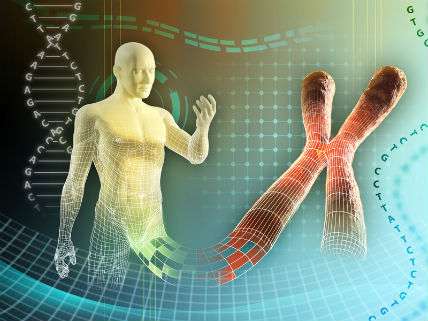Is It Ethical to Synthesize an Entire Human Genome? Yes!
Genomes are not "sacred" entities needing some kind of special moral consideration.

Stanford bioetech researcher Drew Endy and Northwestern University bioethicist Laurie Zoloth ask this week, "Should We Synthesize a Human Genome?" They say go slow. My short answer is, yes.
Their question was provoked by their alarm over the fact that a group of 150 biotech researchers from academia and entrepreneurs from industry met behind closed doors in an invitation-only conference earlier this week to discuss, among other things, the possibility of creating a complete human genome from scratch. Back in 2010, a team led by biotech pioneer and provocateur Craig Venter created the first lifeform whose genome was entirely synthesized. Basically the genome of the bacterium Mycoplasma mycoides was constructed from off-the-shelf chemicals.
According to Endy and Zoloth, the group convened earlier this week at Harvard University. The two object that "such an enormous moral gesture should not be discussed behind closed doors." They acknowledge that "such a synthetic genome could then be tested in a laboratory by replacing the existing genome within a human cell. All this would still be far removed from making a synthetic human." Well, yes. A human cell is not a human being.
Nevertheless, Endy and Zoloth argue that "the possibility of making a human cell, whose genome is realised from only digital information and raw materials, should trigger broader considerations." To highlight their concerns they speculate:
Would it be OK, for example, to sequence and then synthesise Einstein's genome? If so how many Einstein genomes should be made and installed in cells, and who would get to make them?
Taking a step back, just because something becomes possible, how should we approach determining if it is ethical to pursue?
Given that human genome synthesis is a technology that can completely redefine the core of what now joins all of humanity together as a species, we argue that discussions of making such capacities real, like today's Harvard conference, should not take place without open and advance consideration of whether it is morally right to proceed.
This is sloppy ethical thinking. Genomes are not some kind of special "sacred" entities. If it is morally all right to synthesize the genome of a bacterium or even of a mammoth, then it is OK to do the same with the human genome. If is morally OK to know what each and every base pair of a human genome is, there is no ethical reason not to reverse engineer it. It's the same entity.
The skills and knowledge developed through efforts to synthesize the entire human genome could clearly be put to many therapeutic uses including fixes to genetic disease variants. And yes, it's pretty clear that the fear lurking behind the article by Endy and Zoloth is that the techniques developed could be used to enable parents in the future to give their children enhanced qualities such as stronger bodies and nimbler brains. What a moral disaster that would be!
Endy and Zoloth assert:
The perspectives of others including self-identified theologians, philosophers, and ethicists from a variety of traditions should be sought out from the very beginning.
Critical voices representing civil society, who have long been sceptical of synthetic biology's claims, should also be included.
First and most importantly, promiscuously handing out moral vetoes in advance to technological reactionaries is itself unethical. Human progress does not proceed by committee votes.
Second, not everybody has got to be in every meeting. Endy and Zoloth want a societal conversation (whatever that means) about this prospect. Fine, so just think of the Harvard conference as the preliminary meeting aimed at organizing it. There's plenty of time for anti-technology activists to jump in and try to stifle progress.
Finally, yes, it is OK for someone to synthesize Einstein's genome. It's just one DNA base after another.


Show Comments (64)